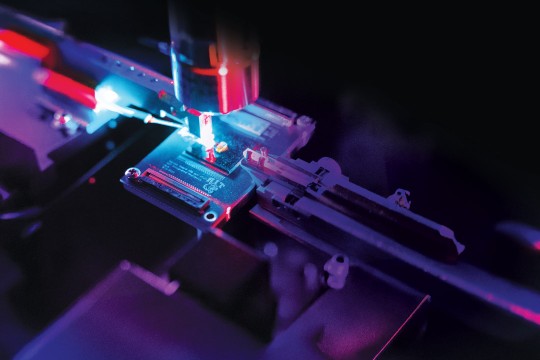Electrical Engineering Master of Science Degree

Electrical Engineering
Master of Science Degree
- RIT /
- Rochester Institute of Technology /
- Academics /
- Electrical Engineering MS
Overview for Electrical Engineering MS
Why Study Electrical Engineering at RIT?
STEM-OPT Visa Eligible: The STEM Optional Practical Training (OPT) program allows full-time, on-campus international students on an F-1 student visa to stay and work in the U.S. for up to three years after graduation.
Eight Dynamic Focus Areas: Choose from communications, controls, digital systems, electromagnetics, integrated electronics, MEMs, robotics, or signal and image processing.
Multiple Options to Complete Your Degree: Complete your degree with a thesis, research project, or comprehensive exam.
Preparation for Advanced Study: You'll be well-prepared to pursue a Ph.D. after graduation if you should choose to do so.
In the electrical engineering master’s degree, you can customize a specialty of your choosing while working closely with electrical engineering faculty in a contemporary, applied research area. The program gives you the skills to solve industry and business challenges and deploy high-level solutions to problems affecting the world of engineering technology today. The master's degree in electrical engineering also prepares you for advanced study in doctorate programs, including RIT's microsystems engineering Ph.D. and electrical and computer engineering Ph.D.
RIT’s Electrical Engineering Master’s Degree
In the master’s degree in electrical engineering, you have the option of completing a thesis or graduate paper. For those who choose the graduate paper, an additional course is required. Students may also choose a course-only option with a comprehensive exam. All students are expected to attend two semesters of electrical engineering graduate seminar.
Focus Areas: You are required to choose among the following eight focus areas: communications, controls, digital systems, electromagnetics, integrated electronics, MEMs, robotics, or signal and image processing.
Graduate Paper/Thesis: In order to earn a master's in electrical engineering, you must complete a graduate paper or a graduate thesis.
-
Affordable Now. Valuable for Life.
Earn your master’s degree without the full price tag. With Master Up you can receive a 30% tuition scholarship for an RIT master’s degree.
-
Meet us on-campus on February 19
Learn about the programs that interest you. Hear from program faculty, speak with current graduate students, and ask the questions that will help you get one step closer to your career goals.
Careers and Cooperative Education
Typical Job Titles
| Electrical Engineer | Machine Learning Engineer | Firmware Engineer |
| Product Development Engineer | Robotics Engineer | Circuit Design Engineer |
| AI Engineer | Controls Engineer | Software Engineer |
Cooperative Education
What makes an RIT education exceptional? It’s the opportunity to complete relevant, hands-on engineering co-ops and internships with top companies in every single industry. At the graduate level, and paired with an advanced degree, cooperative education and internships give you the unparalleled credentials that truly set you apart. Learn more about graduate co-op and how it provides you with the career experience employers look for in their next top hires.
Cooperative education is optional but strongly encouraged for graduate students in the electrical engineering master’s program.
Featured Work and Profiles
-
NSF Honors Bing Yan for Breakthrough Smart Grid Work
RIT’s Bing Yan has been awarded a 2024 NSF CAREER Award for her research aimed at improving smart grid management through better integration of renewable energy resources and enhanced storage capacity...
Read More about NSF Honors Bing Yan for Breakthrough Smart Grid Work -
Student Merges Art and Engineering to Revolutionize Glucose Monitoring
Dylan Bennish ’24 BS, MS (electrical engineering) blends art with engineering to screen print textile antennas capable of tracking glucose levels with more cost-effective and less invasive methods.
Read More about Student Merges Art and Engineering to Revolutionize Glucose Monitoring
Curriculum for 2025-2026 for Electrical Engineering MS
Current Students: See Curriculum Requirements
Students are also interested in
Admissions and Financial Aid
This program is available on-campus only.
| Offered | Admit Term(s) | Application Deadline | STEM Designated |
|---|---|---|---|
| Full‑time | Fall or Spring | Rolling | Yes |
| Part‑time | Fall or Spring | Rolling | No |
Full-time study is 9+ semester credit hours. Part-time study is 1‑8 semester credit hours. International students requiring a visa to study at the RIT Rochester campus must study full‑time.
Application Details
To be considered for admission to the Electrical Engineering MS program, candidates must fulfill the following requirements:
- Complete an online graduate application.
- Submit copies of official transcript(s) (in English) of all previously completed undergraduate and graduate course work, including any transfer credit earned.
- Hold a baccalaureate degree (or US equivalent) from an accredited university or college in engineering or a related field. A minimum cumulative GPA of 3.0 (or equivalent) is recommended.
- Satisfy prerequisite requirements and/or complete bridge courses prior to starting program coursework.
- Submit a current resume or curriculum vitae.
- Submit a personal statement of educational objectives.
- Submit two letters of recommendation.
- Entrance exam requirements: GRE required
- Submit English language test scores (TOEFL, IELTS, PTE Academic, etc.), if required. Details are below.
English Language Test Scores
International applicants whose native language is not English must submit one of the following official English language test scores. Some international applicants may be considered for an English test requirement waiver.
Duolingo (DET): 120
IELTS: 6.5
LanguageCert Academic: 70
PTE Academic: 56
TOEFL: 79/4.5
International students below the minimum requirement may be considered for conditional admission. Deaf and hard-of-hearing test takers with significant hearing loss do not need to take the listening and speaking sections for the TOEFL and IELTS. Each program requires balanced sub-scores when determining an applicant’s need for additional English language courses.
How to Apply Start or Manage Your Application
Cost and Financial Aid
An RIT graduate degree is an investment with lifelong returns. Graduate tuition varies by degree, the number of credits taken per semester, and delivery method. View the general cost of attendance or estimate the cost of your graduate degree.
A combination of sources can help fund your graduate degree. Learn how to fund your degree
Additional Information
Bridge Courses
Applicants with a bachelor's degree in fields outside of electrical engineering may be considered for admission, however, bridge courses may be required to ensure the student is adequately prepared for graduate study.
Accreditation
FAQs
Yes, the GRE is required for admission to the electrical engineering MS program. All applicants must submit valid GRE scores to be considered.
You can choose from eight dynamic focus areas to customize your degree: communications, controls, digital systems, electromagnetics, integrated electronics, MEMS (Micro-Electro-Mechanical Systems), robotics, or signal and image processing.
Yes, you must complete a graduate paper or a graduate thesis.
Yes, the electrical engineering MS is a STEM Optional Practical Training (OPT) program which allows full-time, on-campus international students on an F-1 student visa to stay and work in the U.S. for up to three years after graduation.
Research
Please visit the research profiles on the electrical and microelectronic engineering department for an overview of research opportunities. Visit individual faculty profiles for a more complete list of research advisors in the program.
Related News
-
November 19, 2025

Manifesting quantum: How RIT researchers are navigating the next frontier of physics
RIT researchers are zeroing in on quantum photonics, the creation, control, and detection of light. Photonics has long been a specialty of the university. RIT led the team that developed the first quantum photonic wafer, which is key to the future of mass-produced quantum communication systems.
-
December 9, 2024

Distinguished Alumni Award winners named for 2024-2025
CEOs, Chief Financial Officers, and Chief Technology Officers are among the 12 RIT alumni honored with Distinguished Alumni Awards for the 2024-2025 year.
-
May 1, 2024

Students score with RIT Sports Network
Since 2002, more than 1,200 students have gained valuable experience creating a multimedia production ensemble with RIT Sports Network.
Contact
- Lindsay Lewis
- Senior Assistant Director
- Office of Graduate Admissions
- Enrollment Management
- 585‑475‑5532
- lslges@rit.edu
- Jayanti Venkataraman
- Associate Department Head
- Department of Electrical and Microelectronic Engineering
- Kate Gleason College of Engineering
- 585‑475‑2143
- jnveee@rit.edu
Department of Electrical and Microelectronic Engineering


















